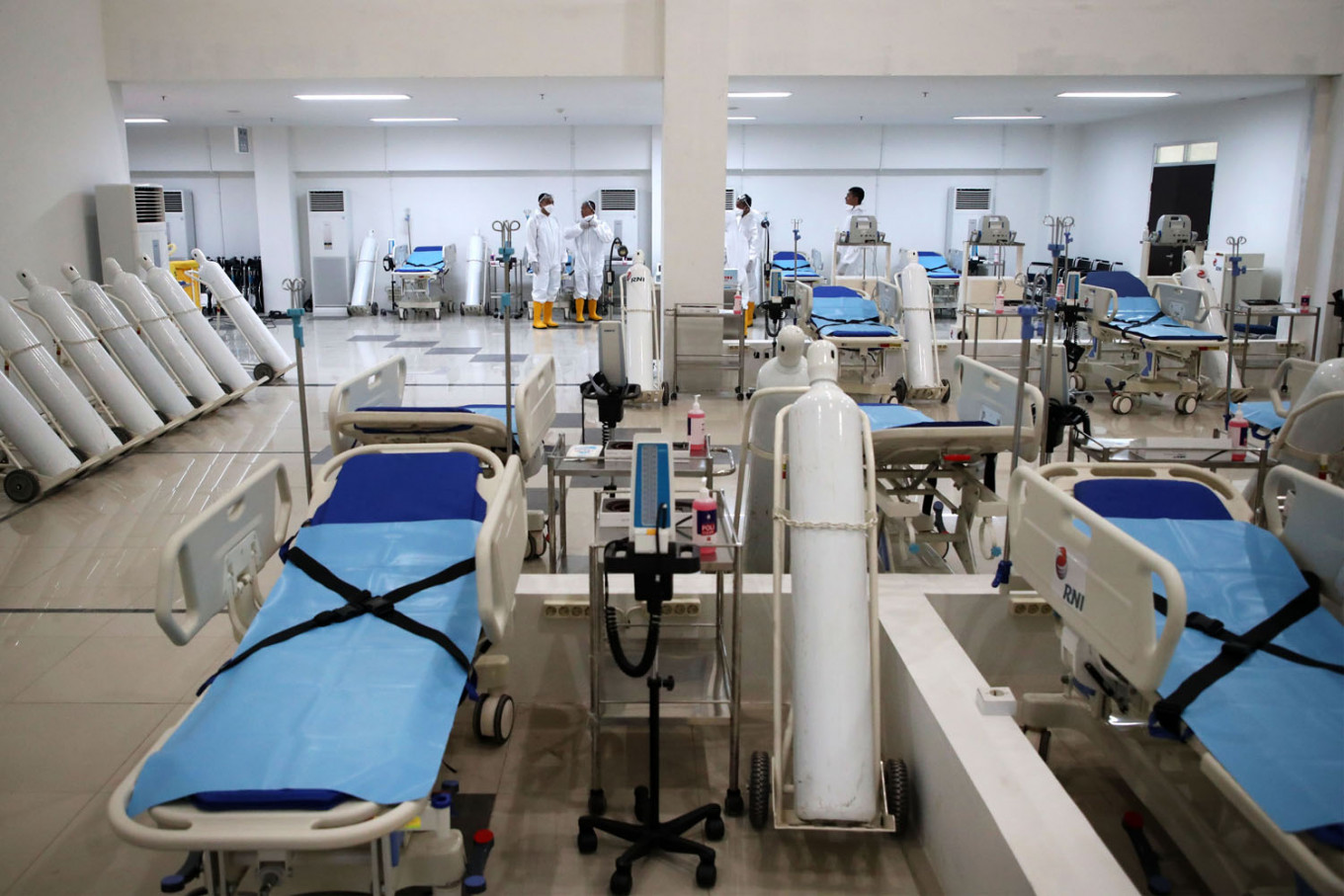Popular Reads
Top Results
Can't find what you're looking for?
View all search resultsPopular Reads
Top Results
Can't find what you're looking for?
View all search resultsHospitals seek safeguards for employees
Change text size
Gift Premium Articles
to Anyone
T
he rising number of coronavirus cases in Jakarta has forced the capital’s administration to add 13 city-owned hospitals to the roster of COVID-19 referral hospitals that specifically treat patients with the disease. But as the hospitals prepare for their transformation, many challenges remain.
Medical specialists have been working tirelessly on the front lines as their colleagues support other essential services for patients who require care.
However, as more hospitals are enlisted to treat COVID-19, all their medical workers face similar exposure to the deadly disease.
Sawah Besar Hospital president director Budi Wibowo said the hospital's management had attempted to motivate its medical workers after learning that they had been appointed to help treat coronavirus patients.
“It’s human to be worried, right? Especially when we first find out about it. But Jakarta needs to add more beds, so we tried to persuade and motivate our team to take on this responsibility,” Budi told The Jakarta Post on Thursday.
He added that guarantees of their occupational safety had to follow. “We shouldn’t motivate them to do something if we cannot guarantee their safety. What we can do is repair existing facilities, such as [adjusting] the flow of patients and air circulation,” Budi said.
“The latter is no less important than providing protective equipment.”
Tanah Abang Hospital president director Savitri Handayana shared that sentiment, saying that safety for both visitors and workers was of the utmost importance.
“When we change the [hospital’s] status to serve only COVID-19 patients, everything inside the building is automatically put at a higher risk. We must therefore prepare the infrastructure and services to increase our safety standards,” she said, noting that there was initially anxiety among staff members.
“If health workers are dying, who will treat the patients?”
Both Budi and Savitri said that health workers aged 50 and above and those with comorbidities would be assigned tasks with a lower chance of interacting with COVID-19 patients, whether at the pharmaceutical or nutrition divisions or in administration.
But Savitri said the workers remained committed to serving the public.
“Medical workers have to be ready for any circumstances. We have taken the [Hippocratic] Oath,” she said.
Concerns over the occupational hazards of medical workers have emerged following what the Indonesian Medical Association (IDI) describes as a “speeding up” of the COVID-19 death rate among Indonesian doctors.
The association reported on Friday that two more doctors had died of the disease in the past three days, bringing the nationwide death tally to 117 doctors.
The World Health Organization has demanded minimum standards for occupational safety to be implemented in healthcare facilities in the wake of the rising number of health workers infected by the disease.
Health workers represent less than 3 percent of the population in most countries but account for around 14 percent of all COVID-19 cases globally, with an even higher proportion of 35 percent reported in some countries, according to the agency.
Indonesia has among the highest COVID-19 death rates for medical workers in the world.
Siti Ainun Dwiyanti, president director of Jati Padang Hospital in South Jakarta, said that the most challenging transformation for hospitals was to deploy more health workers. The five-story hospital in South Jakarta will have a total of 63 beds, an increase from 12, within the next three weeks.
So far, the hospital management has accepted 13 volunteer doctors and nurses and is requesting more from the city’s health agency.
Siti said the criteria for patient discharge would also be stricter. “We can’t [afford to] haphazardly transfer patients under hospitalization,” she said.
Officials have said the city has recently recruited some 1,800 medical workers to support the dwindling number of healthy practitioners, while more hospitals are being enlisted for help.
The city health agency issued a circular on Sept. 4 appointing 13 city-owned hospitals to treat COVID-19 patients only, in an attempt to increase bed capacity. As of Sunday, the occupancy rates for isolation beds and ICU beds in Jakarta had reached 75 and 83 percent, respectively.
In addition to the 13 hospitals, Jakarta has 54 referral hospitals, which, aside from serving non-COVID-19 patients, also treat patients with moderate to critical COVID-19 symptoms.
There is also an emergency hospital at the Wisma Atlet compound in Central Jakarta that is used for self-isolation purposes and the treatment of patients with mild and moderate symptoms, and state-owned oil and gas giant Pertamina has built an emergency COVID-19 hospital as well.
Indonesian Public Health Experts Association (IAKMI) chairman Ede Surya Darmawan said that increased safety standards were urgently needed to prevent more health workers from getting infected, which, if not addressed properly, would lead to a total collapse of the healthcare system.
“The principles are similar to before, as hospitals anywhere must employ risk prevention and reduction of infectious disease measures. But with the change in status, all aspects must be upgraded, including the frequency of disinfection, regular testing for workers, and the [capacity] of laboratories to perform more tests,” Ede said.
"Paying special attention to health workers should be a priority.”










